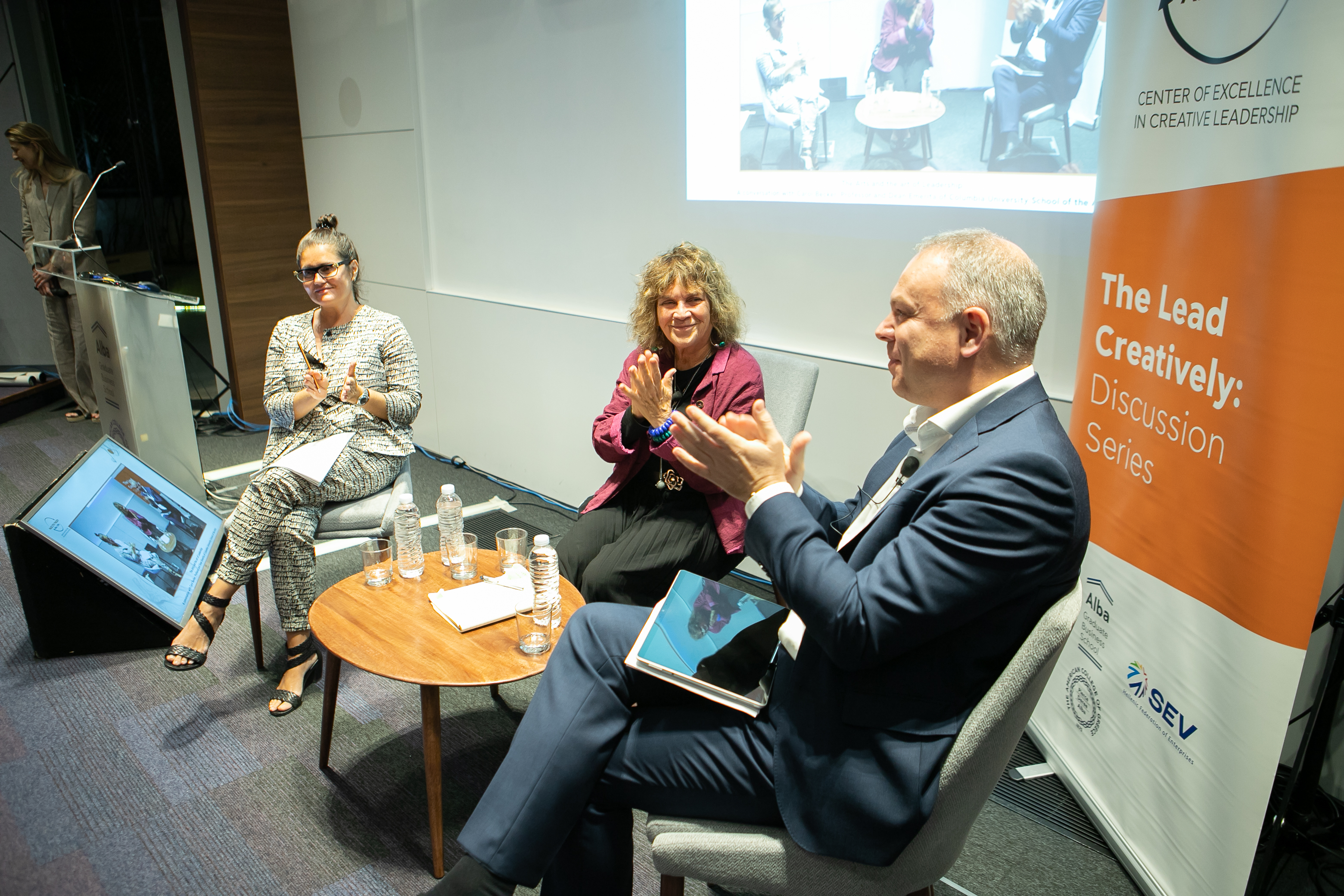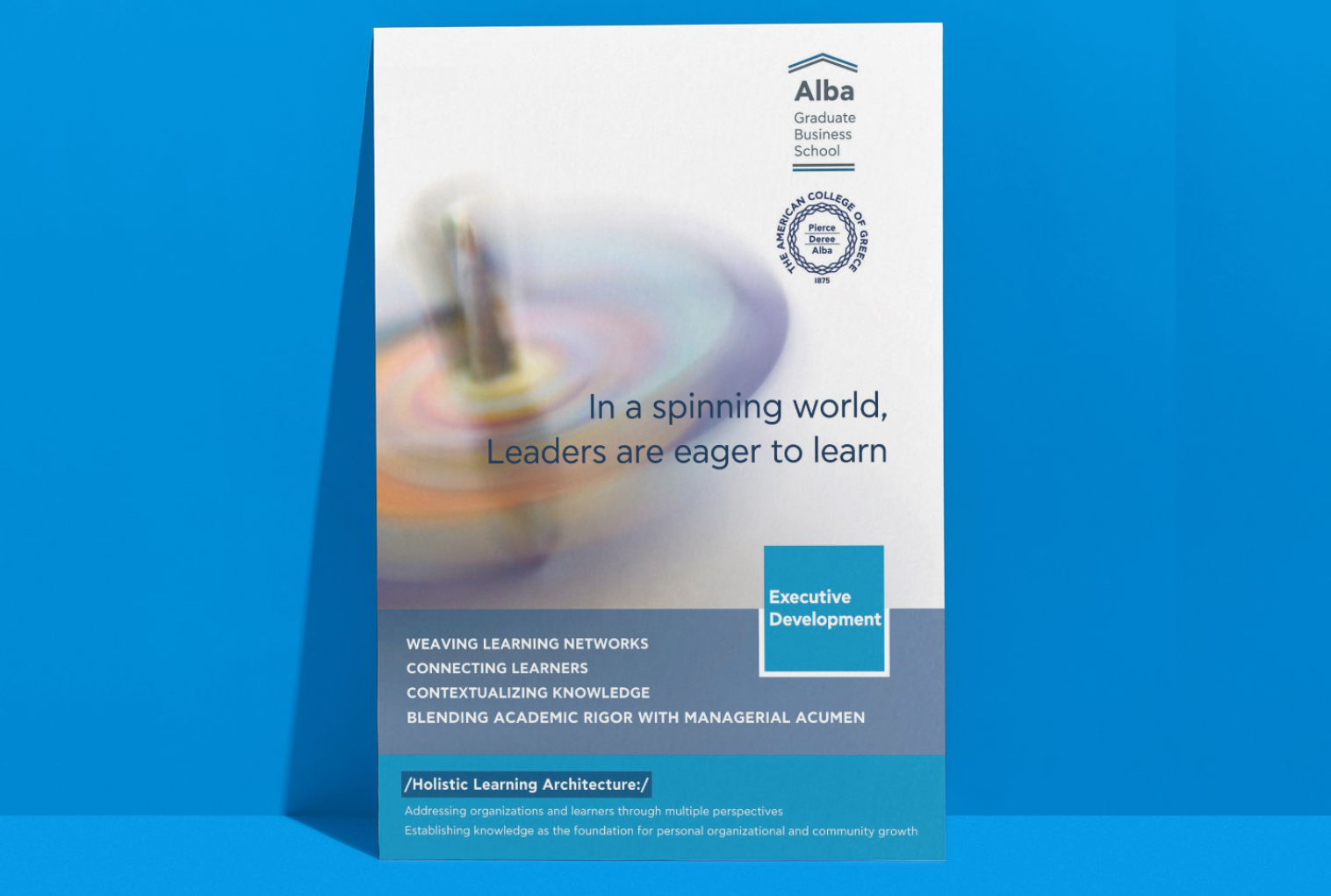
A Conversation with Carol Becker, Professor and Dean Emerita of Columbia University, on Fostering Creative Leadership and Innovation
What role does fostering a culture of imagination and creativity play in ensuring the long-term adaptability and success of businesses in today's rapidly changing environment?
In a thought-provoking and insightful conversation, Carol Becker, Professor and Dean Emerita of Columbia University School of the Arts, took center stage to share her profound insights on the transformative power of the Arts. The event, hosted by the SEV Center of Excellence in Creative Leadership and titled "The Arts & the Art of Leadership: A Conversation with Carol Becker," took place on October 12 and brought together a diverse audience eager to hear Professor Becker’s thoughts on the relationship between the arts and leadership and how this relationship can fuel creativity and innovation in the business world, helping individuals to address society’s complex challenges and enabling them to pave the way for a more resilient and sustainable future.
The event began with welcoming remarks from Machi Doumoura, Curator at the SEV Center of Excellence in Creative Leadership. Dora Economou, Director of Human Capital Affairs at SEV, highlighted the collaboration between SEV and Alba in nurturing Greek entrepreneurship and inspiring leaders. In fact, this collaboration has supported 1,500 executives in their pursuit of knowledge through scholarship programs. She stressed that academic institutions are increasingly recognizing the value of incorporating the arts into leadership training: “More and more universities are bringing the arts into their MBAs to promote the creativity of future business leaders. Leadership is actual art, not metaphorically speaking. Leaders, like artists, may inspire, motivate, challenge, promote self-expression and out-of-the-box thinking and can change our lives."
 (1000 x 650 px) (1403 x 1052 px) (500 x 354 px) (672 x 449 px) (745 x 496 px) (500 x 260 px) (855 x 401 px) (1060 x 596 px) (285 x 63 px) (1286 x 859 px) (1070 x 726 px) (1181 (5)(11).jpg)
Dr. Kostas Axarloglou, Dean of Alba Graduate Business School, painted a vivid picture of the VUCA (Volatile, Uncertain, Complex, Ambiguous) world that has become the norm in business and highlighted the necessity of adopting a Renaissance mindset: “We live in a VUCA world where there is constant, unpredictable change. This is now the norm in areas of the business world, and we see things we haven’t seen before. The way to move forward is to have another mindset. This is the Renaissance person who not only has one specialization but also an understanding of other specializations.”
 (1000 x 650 px) (1403 x 1052 px) (500 x 354 px) (672 x 449 px) (745 x 496 px) (500 x 260 px) (855 x 401 px) (1060 x 596 px) (285 x 63 px) (1286 x 859 px) (1070 x 726 px) (1181 (5)(14).jpg)
Professor Nikos Mylonopoulos, Director of the SEV Center of Excellence in Creative Leadership, reflected on the decade-long efforts at Alba to integrate the arts into its curricula. He emphasized the importance of aligning financial objectives with broader social and environmental goals when he stated, “Why do we need to have this conversation between the arts and business? Companies need to be creative, innovative and want to align financial objectives with broader social and environmental goals. Artists do the same. Through their creative process, they respond to their environment."
 (1000 x 650 px) (1403 x 1052 px) (500 x 354 px) (672 x 449 px) (745 x 496 px) (500 x 260 px) (855 x 401 px) (1060 x 596 px) (285 x 63 px) (1286 x 859 px) (1070 x 726 px) (1181 (5)(15).jpg)
The heart of the event was a captivating discussion between Professor Becker and Georgia Kotretsos, Founder of THE ΤΕΛΟΣ SOCIETY, Arts & Culture Research Lab Observatorium, and Associate Lecturer, Frances Rich School of Fine and Performing Arts, Deree – The American College of Greece. Moderator Dr. Mylonopoulos opened the conversation with the thought-provoking query: Can the world of business learn more from the art world?
 (1000 x 650 px) (1403 x 1052 px) (500 x 354 px) (672 x 449 px) (745 x 496 px) (500 x 260 px) (855 x 401 px) (1060 x 596 px) (285 x 63 px) (1286 x 859 px) (1070 x 726 px) (1181 (5)(15).jpg)
Professor Becker shared her deep connection with Greece, recounting since she was a Fulbright scholar who felt Greece as her second home. She explained how her diverse background, from academia to journalism, led her to her role as Dean of the School of the Art Institute of Chicago. During her term, she transformed the institution into the #1 art school in the U.S. by supporting a horizontal structure that encouraged interdisciplinary communication, collaboration and trust. Professor Kotretsos, a visual artist and alumna of the school, praised the environment Becker created, where resources were readily available and students were equipped with tools to seek opportunities for themselves. Professor Becker's emphasis on building trust and holding a safe space for experimentation resonated with Professor Kotretsos' view that freedom in a creative environment enhances the learning process.
Professor Becker emphasized that effective leadership involves building trust and changing minds. She recounted her mission as Dean of Columbia School of the Arts, where she aimed to make the school an integral part of Columbia University and the global community, despite initial challenges such as limited funding and limited recognition.
Creative freedom can exist only within certain institutional boundaries, wherein rules, of course, should not be arbitrary. Becker pointed out that learning to work within institutional structures is valuable preparation for working in the world at large.
Part of the creative process is play. Becker drew from Donald Winnicott's theory on "Playing," highlighting the importance of academic institutions to provide a safe space for experimentation and the development of personal perspectives. Professor Becker's collaboration with the World Economic Forum (WEF) also demonstrated the transformative potential of art in the development of young leaders. Her work with the WEF involved teaching vocal exercises and theater training to future leaders, allowing them to discover their authentic voices. Artists, she noted, bring originality to discussions, a perspective grounded in trust of the unknown.
 (1000 x 650 px) (1403 x 1052 px) (500 x 354 px) (672 x 449 px) (745 x 496 px) (500 x 260 px) (855 x 401 px) (1060 x 596 px) (285 x 63 px) (1286 x 859 px) (1070 x 726 px) (1181 (5)(13).jpg)
Kotretsos added that in a creative environment, introducing freedom and adaptability enhances the creative process when she stated, “Living with creative uncertainty is part of the experimental nature of the process—inherited in the work artists do. Art schools recognize the value of the art process which is in constant flux. This process is essential, yet it is not evident in the “finished” work. This aspect of artists’ work could be understood as research—not just the preparation for the actual making of the work but, rather, the entire endeavor, which allows for the open-endedness needed to complete the work and the constant evolution of knowledge that results.”
In the Q&A session, a member of the audience raised the question of how artists would use AI. Professor Becker reflected on the artist’s constant evolution and how they push the boundaries of what is possible when she stated: “Artists are constantly evolving and have always found ways to incorporate new technologies into their work, pushing the boundaries of what is possible and creating new forms of expression."
In her closing remarks, Professor Becker commended Alba's commitment to integrating arts into their curricula and stressed the importance of breaking down silos between disciplines for the betterment of the world. The event served as a testament to the transformative power of the arts. Professor Becker's wisdom and experiences left a lasting impression on all those seeking to navigate today's intricate and swiftly evolving business and societal landscape.




 (1000 x 650 px) (1403 x 1052 px) (500 x 354 px) (672 x 449 px) (745 x 496 px) (500 x 260 px) (855 x 401 px) (1060 x 596 px) (285 x 63 px) (1286 x 859 px) (1070 x 726 px) (1181 (5)(12).jpg)
